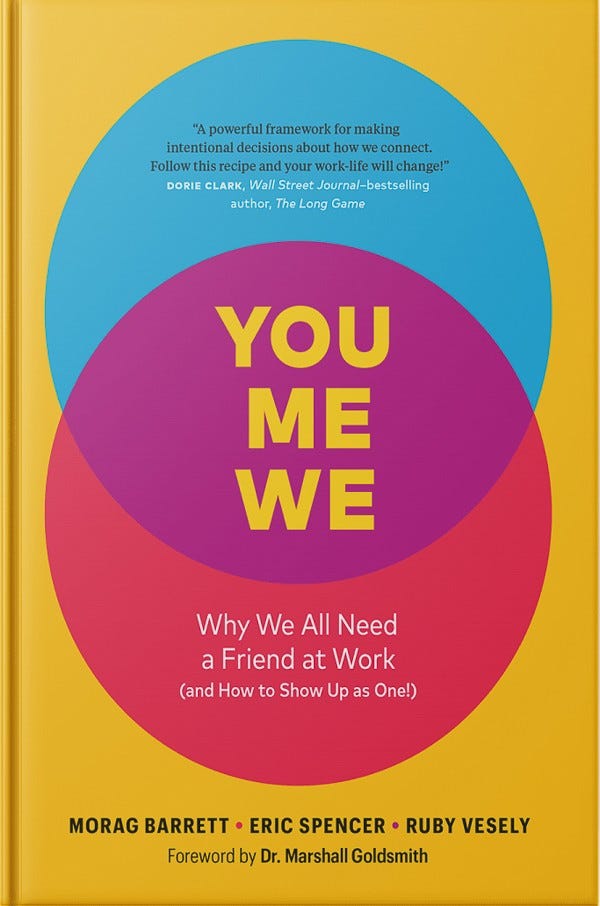This past week, Jacquelyn and I went to Toronto to welcome and onboard Niya and Andy, two new 100 Coaches Agency team members. We spent a fantastic few days working with our new partners to deconstruct and reconstruct the purpose and intention of the company and to write our team contract in which we established what we are committing to and what we are committing to not do. We ate good food, watched a hockey game (of course), and collaboratively solved puzzles to escape an escape room (fun!). Then Niya and Jacquelyn joined me in NY this weekend to continue our integration by seeing thought-provoking shows, enjoying more meals, and spending time together. These moments of transition are crucial because they are when relationships and commitments are formed. They are times of fluid thought, open hearts, and expansive ideas.
These moments in between have the most potential for growth and expansion because we are not yet committed to a certain action or ideal. The word liminal, meaning occupying a position on both sides of a boundary or threshold, is a good shorthand for this idea. Liminal spaces are unusual because they hold vast potential - any outcome is possible. We feel this all the time in sports - when a skier initiates a turn and releases an edge, for a moment, they are floating between turns before committing to the next edge. The tennis player waiting for the serve bounces from foot to foot, ready for whatever serve is delivered. At a concert, when one song has ended, there is a liminal space brimming with anticipation before the first note of the next song. The baker, the artist, and the writer all know the liminal space of preparation for the creation and making changes on the fly, in the flow.
From a particular perspective, liminal spaces are rare and luxurious in a world that seems to demand we commit, take sides, and make decisions. What makes these liminal spaces, these times in transition, so exceptional is that during that period, anything is possible because nothing is determined. And in those moments, we are free to hold conflicting ideas together, weighing our options. We stand in two places simultaneously, believing that we will have to make a decision, and for this moment, we have both. It is a time when we have not yet dug in, a time we can consider alternatives, and a time to be open, curious, inviting, and flexible.
I contend that we are always in transition, and by understanding that perspective, we could be more open, productive, and less stressed out. Being in transition is a matter of perspective. We are in transition from birth to death and from inhale to exhale. We are transitioning between the idea (or ideology) we are committed to today and the one we will hold in the future. We are between where we are going and where we have been. Laurie Anderson sings, "you're walking and... with each step, you fall forward slightly and then catch yourself from falling. You are walking and falling at the same time." As long as we are in motion, we are in transition.
In life and leadership, the liminal space is where we are first and foremost in a relationship with the people and things around us - our friends, family, teammates, and environment. We find ourselves unattached to a specific view or outcome, making us open to other points of view. The liminal space is a place of creativity, innovation, and connection where conflicting ideas can be jointly held and considered. It supports new growth, potential, and possibilities. We are not yet committed to a single result, direction, or solution when we transition. In our coaching work, we understand that people change only when they are open to change. The openness to change only occurs when they have entered the liminal space of their potential, of seeing how they can change their behavior and see beyond their limiting beliefs. Working with our new team this week, we took the time to get to know each other, understand the potential of our collaboration, and expand our ambitions beyond our current thinking. I am confident we will draw from this well frequently and return to our liminal space to adjust course and rejuvenate our aspirations. With a bit of luck and a lot of intention, we will stay in transition.
Modern Wisdom, Ancient Roots: The Movers and Shakers' Guide to Unstoppable Success by Srikumar Rao On sale Oct 4th (today) here
As you might imagine, being in the 100 Coaches world is full of extraordinary authors whose writing changes the lives of millions of leaders and the people they lead. There are a few people whose work can be universally applied to everyone every day this book by Srikumar is one of them. I had the good fortune to take his exceptional class, Creativity and Personal Mastery (CPM), which was transformative. He has distilled much of the teaching from that class into this book, and it will be a guide that will nourish me for years to come. His claims that It is possible for you to reach orbits of achievement you never dreamed of and without any stress are true. It does not require hard work. It requires you to change your thinking. When you alter the dysfunctional models you hold, your experience of life improves immediately. Both success and tranquility can be yours. In Modern Wisdom, Ancient Roots, unconventional and highly successful coach Dr. Srikumar Rao distills and condenses valuable life lessons, from ancient masters, sacred writings, and his own experience, into quick-to-read, easily digestible chapters. If you apply the concepts in it, Modern Wisdom, Ancient Roots will make you prosper in all areas of your life.
You, Me, We: Why We All Need a Friend at Work (and How to Show Up As One!) by Morag Barrett, Eric Spencer, and Ruby Vesely pre-order for Oct 18th release here
Every Batman needs a Robin: Move from me to we with the Ally Mindset. In today’s age of Zoom calls and hybrid workplaces, how can leaders foster relationships that allow everyone to succeed? A trio of best friends and leadership consultants at SkyeTeam have the surprising answer: workplace success starts by being a friend. Meet the Ally Mindset, a model for proactive, thoughtful work relationships. As you heal adversarial relationships and strengthen weaker ties, you’ll find that when you have best friends at work―colleagues who have your back―you thrive. Using personal stories, science-backed insights, and valuable lessons from clients including Google, the National Geographic Society, and Microsoft, the authors explore the five key parts of the Ally Mindset and demonstrate how to apply them to your relationships. You, Me, We provides ample evidence for how adopting the Ally Mindset increases happiness, incentivizes collaboration, and improves business outcomes. Because to have a best friend at work, you need to be a best friend at work.
Say It Skillfully by Molly Tschang
Simple, short and actionable videos of real-life scenarios help you find actual words and ways to make tough or sensitive situations less so. Practice what you learn in these bite-sized clips and progress at your own pace. In her “day job” Molly helps senior management to Win As One…which companies often never even try to do. She guides them to commit to each other’s success and build powerful chemistry to lead together. Molly is Founder and CEO of Abella Consulting, a New York-based leadership development and business advisory consultancy and a member of Marshall Goldsmith’s 100 Coaches initiative. She’s held executive leadership positions at Cisco Systems and U.S. Filter, where she led the integration of over 80 acquisitions globally and gained deep expertise in helping executives navigate rapid change and uncertainty in high growth environments. She serves on the boards of several privately-held companies, the Cornell Engineering College Council and Community Solutions—2021 winner of the $100 million MacArthur Foundation “100 & Change” award for accelerating an end to homelessness.
May you have the ability to find joy, excitement, and the potential for change in your liminal space. With love and gratitude, Scott












The liminal spaces you mention resonates with Dee Hock's CHAORD - a combination of chaos and order, where opposing views can be held without fear or concern, and which allows the generation of new ideas. Edward de Bono, the lateral thinking teacher, also promotes similar thinking to boost creativity.